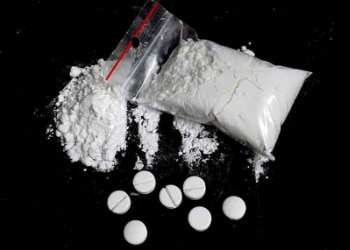US authorities arrested two Dominican citizens in connection to a multimillion-dollar fentanyl shipment delivered from Mexico, suggesting that relations between these two groups may be evolving in the context of the opioid crisis in the North American nation.
Authorities in the northeast US city of Boston arrested Dominican nationals Ángel Javier Morell-Oneill, alias “Cuñao,” and José A. Rodríguez October 22 and seized 32 kilograms of fentanyl — a deadly synthetic opioid that is helping drive US drug overdose deaths — with an estimated street value of nearly $30 million, the US Justice Department announced in an October 23 press release.
The investigation into Morell-Oneill, who authorities have been looking into since June 2018, culminated October 22 when law enforcement officers pulled him over for undisclosed reasons at a traffic stop and discovered two kilograms of fentanyl in the car he was driving. A search warrant was later executed on Morell-Oneill’s house where authorities found an additional 30 kilograms of fentanyl, according to authorities.
SEE ALSO: Coverage of the Dominican Republic
For his part, authorities arrested Rodríguez as he attempted to deliver $20,000 to Morell-Oneill’s house for the driver of a tractor trailer who allegedly delivered the fentanyl to Morell-Oneill. Rodríguez was to pay him half of the $40,000 he was owed for his work, according to authorities.
Investigators allege that Morell-Oneill is a fentanyl distributor and that Rodríguez was delivering the money on behalf of a drug associate of Morell-Oneill — an unidentified Mexican drug trafficking organization for which Rodríguez works as a courier, according to an affidavit from Special Agent Jill Hardie of the US Drug Enforcement Administration (DEA).
The synthetic opioid fentanyl is at the heart of the opioid crisis ravaging US cities. Earlier this year in May, US authorities in western Nebraska state seized more than 50 kilograms of fentanyl — one of the largest busts in the country’s history.
The administration of US President Donald Trump has announced various measures in an effort to combat the opioid crisis, but the recent seizure may be more of a reflection of just how much fentanyl is currently circulating in the country, rather than US authorities having an increased impact on fighting the crisis.
InSight Crime Analysis
Dominican drug trafficking groups have long had a presence along the East Coast of the United States. Mexican and Colombian criminal groups have in the past used them to transport and distribute drugs — primarily cocaine and heroin — at the local level in the country, according to the DEA’s 2017 National Drug Threat Assessment.
However, the latest fentanyl seizure suggests that Mexican criminal groups may be expanding their relationship with their Dominican associates in the United States to traffic fentanyl as the synthetic opioid takes center stage of the US crisis.
The relatively low profile and transnational links of Dominican traffickers in the United States may make them more attractive associates for Mexican drug trafficking groups to work with as US authorities are focused on other groups like the MS13.
China and Mexico are two of the primary sources of fentanyl entering the United States, either directly through the mail system or across the US-Mexico border. Heroin laced with fentanyl is one of the main ways that the drug is sold and consumed in the United States.
SEE ALSO: Coverage of Heroin
US authorities estimate that more than 90 percent of heroin in the United States originates in Mexico, according to the US State Department’s 2018 International Narcotics Control Strategy Report (INCSR).
It’s unclear which Mexican organized crime group was working with the Dominican traffickers who were recently arrested, but the Jalisco Cartel — New Generation (Cartel Jalisco Nueva Generación – CJNG) is reported to be in the business of trafficking fentanyl-laced heroin into the United States and is currently battling a rival group known as Los Viagras in western Michoacán state over control of the production of synthetic drugs.

